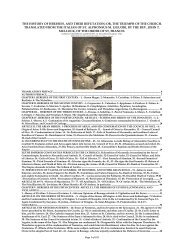The Writings of St. Francis of Assisi - + Saints' Works
The Writings of St. Francis of Assisi - + Saints' Works
The Writings of St. Francis of Assisi - + Saints' Works
You also want an ePaper? Increase the reach of your titles
YUMPU automatically turns print PDFs into web optimized ePapers that Google loves.
THE WRITINGS OF ST. FRANCIS OF ASSISI<br />
mouth 178 and <strong>of</strong>fers to others to be received Him, who will die no more, but who will forever<br />
conquer and has been glorified, 179 upon whom "the angels long to gaze" (1 Pt 1:12)?<br />
"See your" dignity, "brother" (cf. 1 Cor 1:26) priests, and be holy, because He himself is<br />
Holy (cf. Lv 19:2). · And just as above all others on account <strong>of</strong> this ministry the Lord God has<br />
honored you, 180 in this manner also love (dilectio), revere, and honor Him above all others. ·<br />
Great miseries and miserable infirmity, when you hold Him so present and you care for anything<br />
else in the whole world. 181 · Let the whole man tremble with fear, let the whole world begin to<br />
completely quake, and let heaven exult, when upon the altar in the hand <strong>of</strong> the priest is "Christ,<br />
the Son <strong>of</strong> the living God" (Jn 11:27)! · O admirable height and stupendous esteem! O sublime<br />
humility! O humble sublimity, that the Lord <strong>of</strong> the universe, God and the Son <strong>of</strong> God, so<br />
humbles Himself, to hide Himself on behalf <strong>of</strong> our salvation under the limited, little form <strong>of</strong><br />
bread! · See, friars, the humility <strong>of</strong> God and "pour out your hearts before Him" (Ps 61:9); humble<br />
also yourselves, so that you may be exalted by Him (cf. 1 Pt 5:6; Jm 4:10). · <strong>The</strong>refore keep<br />
nothing <strong>of</strong> yourselves for yourselves, so that He may receive you whole, He who manifests<br />
Himself wholly to you.<br />
I warn you on that account and exhort (you) in the Lord, that in the places, in which the<br />
friars are lingering, only one Mass be celebrated during the day according to the manner <strong>of</strong> Holy<br />
Church. 182 · If indeed there are very many priests in the place, let each be content by means <strong>of</strong> the<br />
love (amor) <strong>of</strong> charity to hear the celebration <strong>of</strong> the other priest; · because Our Lord Jesus Christ<br />
fills 183 those present and absent, who are worthy <strong>of</strong> Him. · Who, though He seems to be in very<br />
many places, 184 nevertheless remains indivisible and "knows no loss," but as One everywhere, 185<br />
as it pleases Him, works with the Lord, God the Father, and the Holy Spirit, the Paraclete, unto<br />
the ages <strong>of</strong> ages. Amen.<br />
178 lit. corde et ore sumit. On this phrase cf. Bernard <strong>of</strong> Cluny, loc. cit., VIII,22; PL 184,787; cf.<br />
also fn. 78. By the phrase "heart and mouth" <strong>St</strong>. <strong>Francis</strong> is referring to the two manners <strong>of</strong><br />
receiving the Sacrament: spiritually and sacramentally. For a discussion <strong>of</strong> this distinction, cf. <strong>St</strong>.<br />
Bonaventure, Commentarium in Quattor Libros Sententiarum, Book IV, d. 9, a. 1, q. 1.<br />
179 A reference to the present glorified reality <strong>of</strong> the Humanity <strong>of</strong> Christ, who is received in the<br />
Sacrament; regarding this phrase cf. Bernard <strong>of</strong> Cluny, loc.cit., IX,25-26; PL 184,786-7.<br />
180 cf. Bernard <strong>of</strong> Cluny, loc. cit., VIII,21; PL 184, 784.<br />
181 <strong>The</strong> traditional teaching in Catholic moral theology is that it is a mortal sin <strong>of</strong> pr<strong>of</strong>anation for<br />
a priest to intentionally distract himself during the Sacrifice; it is to this that <strong>St</strong>. <strong>Francis</strong> is<br />
referring here. Hence the congruity <strong>of</strong> the universal Tradition <strong>of</strong> facing east (away from the<br />
people) during the Canon <strong>of</strong> the Mass.<br />
182 What <strong>St</strong>. <strong>Francis</strong> means by this has been debated. Some refer it to a desire that only one Mass<br />
be celebrated each day in a single friary, and that no so-called "private" Masses be <strong>of</strong>fered.<br />
Others refer it to a desire that only one Mass be celebrated according to the Roman Rite, which<br />
was more ornate and lengthy; perhaps it reflects <strong>St</strong>. <strong>Francis</strong>' desire too, that the other priests<br />
exercise that apostolic charity which would move them to say mass for the people in public<br />
churches rather than multiply them inside the friary. For a discussion cf. K. Esser, pp. 321-2.<br />
183 By grace.<br />
184 According to His Humanity, by means <strong>of</strong> the Sacrament <strong>of</strong> His Body and Blood.<br />
185 According to His Divinity. On the previous phrase "knows no loss" cf. Missale Romanum<br />
(1961): Praeconium Paschale Exsultet Sabbato sancto de Vigilia Paschali, "Qui licet sit divisus<br />
in partes, mutuati tamen luminis detrimenta non novit."<br />
Page - 51













